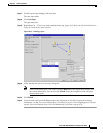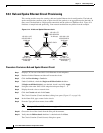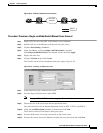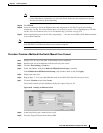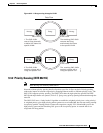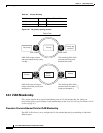
9-21
Cisco ONS 15454 Installation and Operations Guide
November 2001
Chapter 9 Ethernet Operation
VLAN Support
• Circuit name
• Circuit type
• Circuit size
• VLANs on this circuit
• ONS 15454 nodes included in this circuit
Note If the circuit information is not correct use the Back button, then redo the procedure with the
correct information. Alternately, you can click Finish, then delete the completed circuit and
start the procedure from the beginning.
Step 19 Click Finish.
You now need to provision the Ethernet ports and assign ports to VLANs. For port provisioning
instructions, see the “Provision Ethernet Ports” procedure on page 9-3. For assigning ports to VLANs,
see the “Provision Ethernet Ports for VLAN Membership” procedure on page 9-24. Return to the
following step after assigning the ports to VLANs.
Step 20 Highlight the circuit and click Edit.
The Edit Circuit dialog box opens.
Step 21 Click Drops and click Create.
The Define New Drop dialog box opens.
Step 22 From the Slot menu, choose the optical card that links the ONS 15454 to the non-ONS 15454 equipment.
Step 23 From the Port menu, choose the appropriate port.
Step 24 From the STS menu, choose the STS that matches the STS of the connecting non-ONS 15454 equipment.
Step 25 Click OK.
The Edit Circuit dialog box opens.
Step 26 Confirm the circuit information that displays in the Circuit Information dialog box and click Close.
Step 27 Repeat Steps 1 – 26 at the second ONS 15454 Ethernet manual cross-connect endpoint.
Note The appropriate STS circuit must exist in the non-ONS 15454 equipment to connect the two
ONS 15454 Ethernet manual cross-connect endpoints.
9.4 VLAN Support
Users can provision up to 509 VLANs with the CTC software. Specific sets of ports define the broadcast
domain for the ONS 15454. The definition of VLAN ports includes all Ethernet and packet-switched
SONET port types. All VLAN IP address discovery, flooding, and forwarding is limited to these ports.
The ONS 15454 802.1Q-based VLAN mechanism provides logical isolation of subscriber LAN traffic
over a common SONET transport infrastructure. Each subscriber has an Ethernet port at each site, and
each subscriber is assigned to a VLAN. Although the subscriber’s VLAN data flows over shared circuits,
the service appears to the subscriber as a private data transport.



